Do you have a question about the Bad Boy 2011 and is the answer not in the manual?
Steps to change hydro oil on Pup, Lightning, AOS, and Diesel models, including draining and running the mower.
How to change hydro oil filters, including filling new ones with oil and using specific replacement filters.
Procedure to purge air from the system after refilling, by lifting tires and moving drive arms.
Location of the hydro overflow tank on ZT/Outlaw models and the "full cold" line.
Servicing sealed transaxles by removing the filter skid plate and using the filter as an oil drain.
Filling transaxles using check plugs and the hydro overflow tank, noting when they are full.
Purging air from the ZT model hydrostatic system using neutral bypass levers and moving drive arms.
How to adjust the belt tension on AOS/Diesel pump tensioners using jam nuts.
Illustrates pump belt tensioner for ZT, Pup, Lightning, Outlaw models and shows typical pump belt layout.
Using the "quick drain" feature on Kawasaki engines for oil changes.
Information on engine oil changes, drain hoses, oil capacity, and recommended change intervals.
Locating the fuel filter in the fuel line and replacing it annually.
Identifying the vacuum-operated fuel pump, its connections, and checking fuel flow.
Procedure for purging air from the CAT Diesel fuel system using the fuel filter bolt and fuel bulb.
Inspecting, cleaning, and replacing the air cleaner filter, advising against using compressed air.
Location of the 25 amp main fuse on larger commercial engines (27 hp and up).
Location of the 25 amp main fuse on smaller and light duty commercial mowers, near the starter solenoid.
Ensuring the wiring harness ground cable is connected, clean, and tight for proper operation.
Checking the condition and connection of relays under the seat, ensuring wire terminals are seated.
Checking the charging wire voltage from the alternator at full throttle for proper system output.
Specifies torquing the front fork castle nut to 40 ft.lbs. for non-suspension models.
Reinstalling the cotter pin into the castle nut and proper bearing tensioning for front fork assemblies.
Specifies a torque of 53 ft.lbs. for the bearing assembly on suspension mowers (2009 and newer).
Details torquing rear wheel lugs to 65-75 ft.lbs. and retorquing at every oil change.
Specifies torquing the clutch bolt to 50 ft.lbs. and retorquing at every oil change.
Keeping radiator screens clean and free of debris on liquid cooled models.
Identifies grease fittings on front wheels and caster bearing housings, recommending lubrication at every engine oil change.
Locates grease fittings on actuator bar pillow blocks under fuel tanks and recommends greasing twice a season.
Identifies grease fittings on pump and deck belt tensioners, recommending lubrication at every engine oil change.
Locates grease fittings on control arm blocks and recommends greasing once a year.
Adjusting mower tracking by changing pushrod length via swivel joints.
Adjusting hydro pump reaction and control arm resistance by moving pushrods or dampeners.
Procedure for servicing the parking brake, including hub puller use and axle nut torquing.
How to remove the deck belt by lifting and rotating the pulley.
Checking deck level from left to right and front to back, and setting 1/8" front pitch.
Using chain length adjusters to affect overall deck height and left-to-right level.
Adjusting deck pitch (front to back level) using large turn buckles on the front of the deck.
Importance of deck spring tension, consequences of too much or too little, and adjustment method.
Additional deck belt adjustments on AOS/Diesel models using rear "v" idler pulleys.
How blade condition affects cut quality, and the need for resharpening or replacement.
Procedure for changing mower blades, using wood to hold them, and torquing blade bolts.
Information on sealed ball bearings in blade spindles and their replaceability for cost-effective repairs.
Advice on mowing header strips, proper grass height for cool-season grasses, and cutting depth.
Avoiding mowing wet grass, proper clipping disposal, and managing clippings for soil nutrients.
Importance of sharp blades, recommended oil change frequency, and break-in period oil changes.
Using fuel stabilizer at the end of the season and using fresh gasoline in the spring.
Visual examples of leaf blade conditions demonstrating sharp vs. dull mower blades.
Discusses clipping breakdown, nutrient contribution, and considerations for bagging or mulching clippings.
| Brand | Bad Boy |
|---|---|
| Model | 2011 |
| Category | Lawn Mower |
| Language | English |
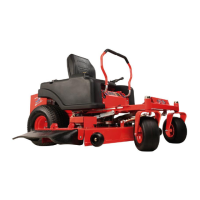
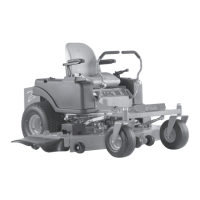
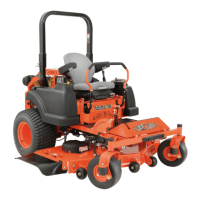
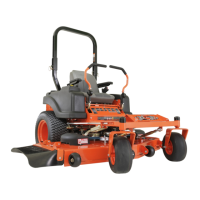

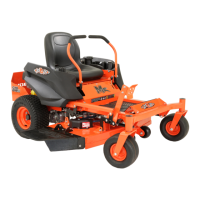
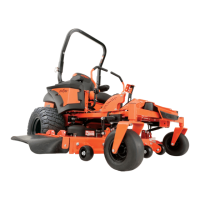
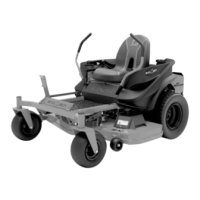
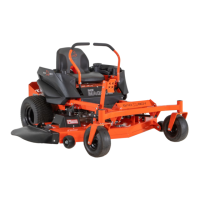
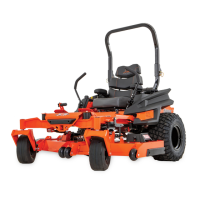

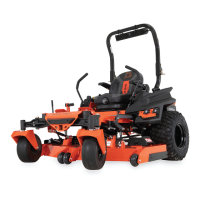
